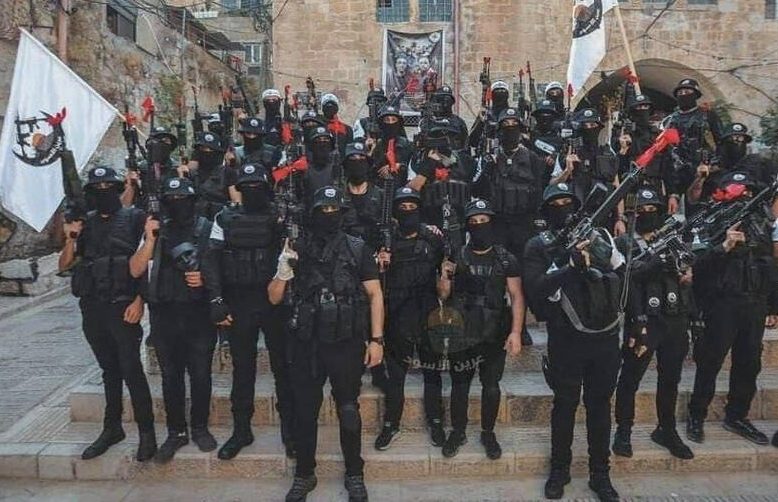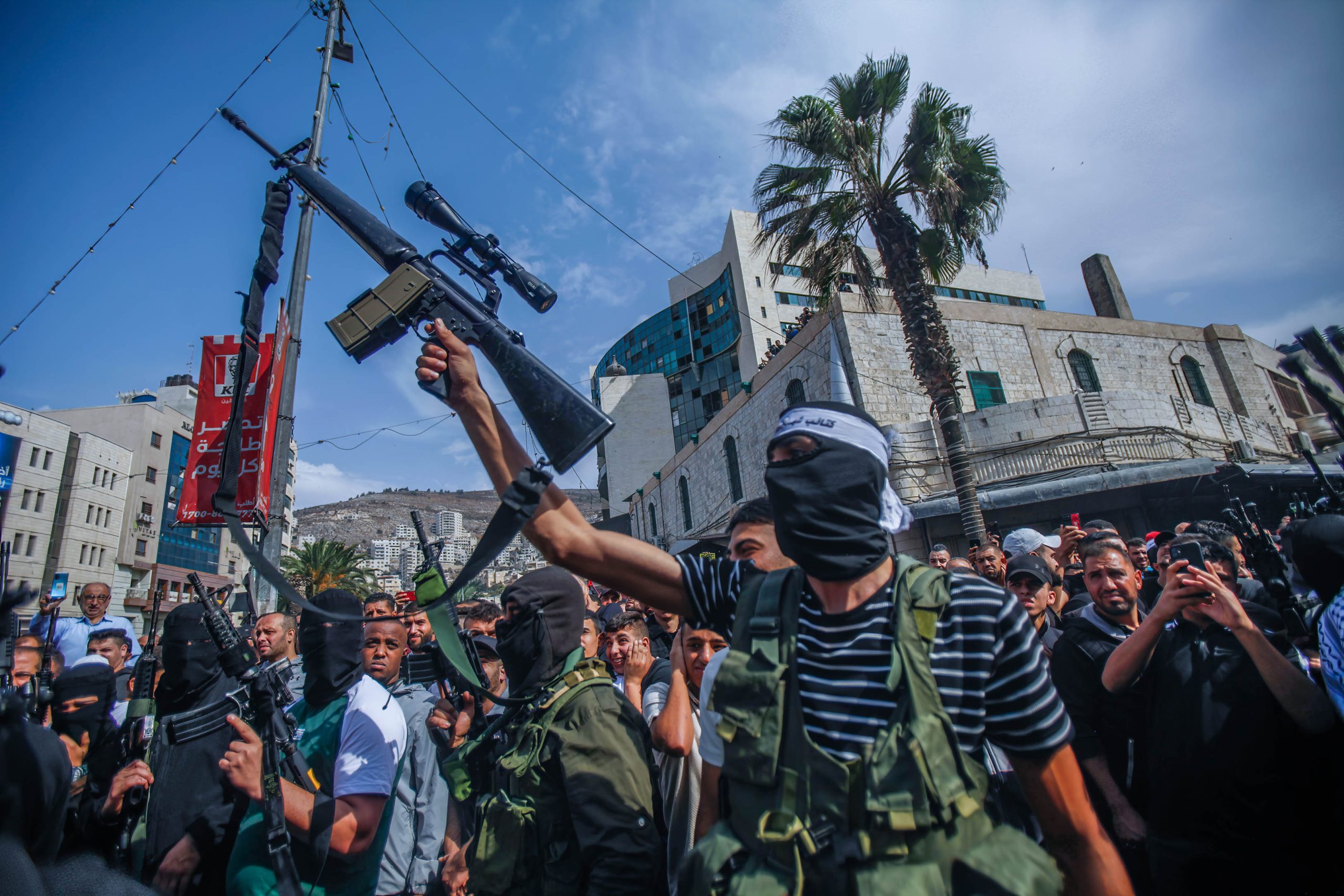Publications
INSS Insight No. 1658, November 14, 2022
As expected, the Israeli security establishment, and in cooperation with the Palestinian security apparatuses, succeeded in dismantling the Lion’s Den armed group in Nablus and substantially weakening the more veteran Jenin Brigade. The two groups propounded a militant ethos and many young people across the West Bank and East Jerusalem are interested in imitating their actions, in light of the loss of hope for the future, as well as in protest against the Palestinian Authority, which they see as a municipal authority of the occupation. This ethos is sharpened further by the election results in Israel, which have sparked concern about harsh measures that will now be used against the Palestinians by the new Israeli government and about the end of the road for the idea of a political process or agreement. In the absence of efforts towards intra-Palestinian unity and in light of the weakening of the PA and Palestinian institutions, it is increasingly likely that armed elements of this kind will appear again, as groups or individuals, in order to maintain an atmosphere of escalation and insecurity on the Jewish side. Accordingly, the principles that guided Israel’s security establishment over 55 years in the West Bank and Gaza, which for the most part ensured calm, should be reexamined by the incoming government.
The Lion’s Den armed group in Nablus met its demise a few weeks after it began operations, and the Jenin Brigade in Jenin has also been weakened. Neither withstood the pressure the IDF and the Palestinian Authority security apparatuses placed on them, which managed to contain them without much bloodshed. In Nablus, some members of the group were killed and others surrendered to PA forces; in Jenin, the group was debilitated in a similar manner. In this way the former met its demise, in spite of demonstrative displays and statements that it should not yet be eulogized, and the volume of activity of the latter, which operated for much longer as a resistance cell, was reduced.
These two groups leave behind them a militant ethos and a model that many young people currently acting independently in different parts of the West Bank seek to imitate. The motive for their activity is frustration over the bitter Palestinian domestic reality and the continued lack of leadership, direction, and vision, which created a vacuum that in their eyes allows Israel to treat PA-controlled territories as its own. Fatah, the PLO, and the PA, which represent one pole of this vacuum, continue – in spite of their significant weakness – to rely on the rules set in the Oslo Accords as an organizing principle, including the aspiration for political negotiations, security coordination, and economic ties with Israel. On the other hand, Hamas sought to maintain the new rules of the game with Israel established in the Gaza Strip, which brought quiet to residents of the area and allowed reconstruction and the development of infrastructure in the Strip. It appears that Hamas, so long as it does not believe that the PA is on the verge of collapse, does not have an interest in violating these rules and being drawn into another confrontation with Israel, of the kind that will once again cause destruction and devastation in the Strip. And thus the PA and Hamas seek to maintain their achievements, which each relies on in the struggle against the other – so long as the option of unity between them does not appear on the horizon. As a result, the lifespan of any group like the Lion’s Den will be short. First, it will immediately become a target of the Israeli security establishment and an adversary of the Palestinian security apparatuses. Second, it will have no organizational or personal infrastructure for turning the messages it seeks to convey with its actions into a worldview that presents the public with a different direction than those that the two veteran leaderships of Hamas and Fatah already propose. Furthermore, the common denominator for these young people is not based on a shared political idea or tendency, and any alternative path they suggest may dismantle the group.
The weakness of leadership and loss of vision began to become clear a few years after the split between the Gaza Strip and the West Bank and the failure of the Annapolis process, and has increased significantly since 2015 when Israeli governments with a clear right-wing agenda took the option of negotiations and mediated resolution off the table, which raised a question in the Palestinian arena about the viability of the political path. The corruption that was exposed increasingly in the Palestinian Authority as it clung to power added more fuel to the flames. This is the basis for groups like the Lion’s Den, comprising young people from their teens to their early forties, who do not have defined common political bases. The popular approval of their activity, the many rallies they held, the extensive press coverage they were given, and Israel’s intensive response to them enhanced their reputation in the eyes of many young people and made them a model to be imitated.
Conduct by supporters and imitators – Udai Tamimi, who killed IDF soldier Noa Lazar at the Shuafat checkpoint on October 8, 2022, and Muhammad al-Jabari, the terrorist from Hebron who murdered Ronen Hanania on October 29 – displayed a different willingness to sacrifice than was formerly evident among Islamist suicide attackers. Tamimi was not found for ten days, and was rediscovered when attempting to commit an attack at the entrance to Maaleh Adumim on October 19. The attacker, who continued firing even after he was hit by several bullets, until he was killed, left behind a letter in which he declared his wish to be an example to other young people, because he knew his act would not lead to the liberation of Palestine. Al-Jabari, who was most likely affiliated with Hamas, specified in a letter that he was not acting in the name of any organization and that he wished to die as a martyr. In contrast, a message published by Lion’s Den operatives celebrated him and declared him one of the Lions of Hebron. In two additional car-ramming attacks there was similar conduct by attackers, who continued their attack after having been wounded: a double car-ramming attack on October 30 at Nebi Musa and at the nearby Almog checkpoint, and the ramming of an IDF officer at the Beit Horon checkpoint on November 1.

The frequency of attacks of this type, alongside harsh criticism leveled at the Palestinian Authority, inter alia for recent attempts by Abu Mazen to further weaken the Palestinian judicial system – such as by establishing a supreme council over all courts of justice under his authority, and his decision without any reasonable explanation to dismantle the elected doctors union – all show a growing gap between him and the public. He appears to be digging in deeper, while the agitation against him and the expectation that he will be removed increase. This is a transitional period characterized by political paralysis, the absence of ability to rehabilitate society, and a pathetic expectation for an external force that will rescue the Palestinian arena from its self-destruction. Israel, especially after the November 2022 elections, is strengthening the understanding forming among the Palestinians that it will not recognize them as a nation with a right to self-determination, and that it has no interest in advancing the two-state solution or dealing effectively with Jewish settler violence against Palestinians and their property. Israel is thus contributing significantly to the rapid deterioration of the Palestinian arena.
The operatives of the Lion’s Den and those who came or will come in their wake seek to tell Israel that they do not believe it can expel them from the PA territories or the West Bank, and that they aim to raise the Palestinian issue among Israeli society, not just in light of the election results. To the PA they say they are tired of its functioning as a collaborator in the Israeli occupation, and that security coordination with Israel should not continue without a renewed political process. They also want to emphasize the need to end corruption in PA institutions and create employment opportunities for the many university graduates who remain unemployed and unable to make use of their skills.
Since Abu Mazen’s decision to cancel the May 2021 elections for the Legislative Council, the decline of the PA’s status and Abu Mazen’s personal status has accelerated. He remains in power due to the fact that there is no agreed-upon successor, and no ability to agree upon a successor, as well thanks to the functioning of the institutions established during his tenure and seen by the public as relevant, while the material resources he has access to maintain their loyalty and continue to function. Israel, which was also interested in canceling the elections, must now reassess its policy in light of the uncertainty in the Palestinian arena. Did refraining from dialogue with the Palestinian side for many years enhance security, and to what extent did it deter Palestinian elements from turning to violence? Such a reassessment should show the need to reset relations with the Palestinians; declare Abu Mazen a partner – or whoever replaces him and follows his path; and display willingness to engage in dialogue with him in order to create stability and sow new hope among Palestinians.
The new government that will soon be established in Israel – which includes those who see the Palestinians as subjects of a lesser status who must show their loyalty to and accept Israeli rule, and which views the continuation of the settlement enterprise as a demonstration of Israeli rule and confirmation of their own existence as a political body – will undoubtedly need to reexamine the considerations that have guided the security establishment over the past 55 years in its actions in the territories and in its relations with the Palestinian population.
How can violent riots be prevented in different places in the same space, in a reality in which two hostile populations live side by side, while Palestinian rage and national sentiment are sizzling? If Israel does not intend to answer the Palestinians’ expectations in the national and political arenas, or renew dialogue with the Palestinians, it should suggest an honorable alternative that would address the desperate tiredness of Palestinians resulting from the reality in which they live, encourage investment in Palestinian infrastructure, and encourage integration in the economy and in Israeli employment centers, with a palpable degree of equality. In the domestic Israeli arena, the new government will be judged by the degree of quiet in the conflict arena and the horizon it creates for Israel as a Jewish state. Within the international community, the government will be judged, at least in part, by its relation to the Palestinian population.



